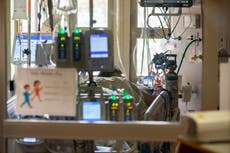Two infants suffer rare brain damage from Covid infection in the womb in landmark case
The authors of the study stress that both cases are rare occurrences
A new study from the University of Miami is revealing the first two cases of Covid-19 infecting infants in the womb and causing brain damage.
On Thursday, researchers at the University of Miami Health Systems and the University of Miami Miller School of Medicine found two cases where Covid-19 breached a mother’s placenta and affected a newborn.
At the Neonatal Intensive Care United (NICU) at Holtz Children’s Hospital, two newborns tested negative for Covid-19 at birth but both had “significantly elevated” antibodies in their blood.
Both infants were born to young mothers who tested positive for the virus at some point in their pregnancies in 2020. Neither mother was vaccinated as vaccines were not available at the time.
At birth, both newborns experienced seizures and acquired microcephaly (small head size) and developmental delays. One infant died at 13 months of age and the other is currently in hospice care.
One infant, born at 32 weeks, experienced seizures in the days after birth, according to the study. The infant was discharged at three months of age with a seizure disorder and microcephaly.
Unlike viruses like Zika, which cause microcephaly at birth, the infant acquired it over time.
Although the newborn’s seizures resolved in the following months, the child experienced respiratory infections and development delays.
At 13 months of age, the child died suddenly. An autopsy showed a “significant reduction in brain weight and cerebral white matter volume” as well as “evidence of virus throughout the brain.”
This study marks the first time researchers have seen Covid-19 in a placenta or an infant’s brain.
The other infant, born at 39 weeks, also experienced seizures after birth and continued to have breakthrough seizures and respiratory infections after being discharged.
At the baby’s one-year exam, it displayed “significant neurodevelopmental delay” and microcephaly.
The authors of the study stress that both cases are rare occurrences. These were the only two instances of babies experiencing devastating brain injuries.
“Many women are affected by Covid-19 during pregnancy, but to see these kinds of problems in their infants at birth was clearly unusual,” Dr Shahnaz Duara, medical director of the NICU at Holtz Children’s Hospital and senior author on the study said. “We’re trying to understand what made these two pregnancies different so we can direct research toward protecting vulnerable babies.”
The authors recommend mothers get vaccinated as their first line of defense against the virus.
Join our commenting forum
Join thought-provoking conversations, follow other Independent readers and see their replies
Comments


Bookmark popover
Removed from bookmarks